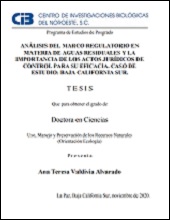| dc.contributor.advisor | Ortega Rubio, Alfredo | |
| dc.contributor.advisor | Beltrán Morales, Luis Felipe | |
| dc.contributor.author | VALDIVIA ALVARADO, ANA TERESA | |
| dc.date.issued | 2020 | |
| dc.identifier | https://cibnor.repositorioinstitucional.mx/jspui/handle/1001/2091 | |
| dc.identifier.uri | http://dspace.cibnor.mx:8080/handle/123456789/3073 | |
| dc.description.abstract | "Las aguas residuales representan uno de los factores que más contaminan el agua y los ecosistemas costeros, poniendo en riesgo la seguridad alimentaria, el acceso al agua potable, la salud de la población y de los ecosistemas. Un cambio de paradigma es necesario para considerar a las aguas residuales como una fuente alternativa y confiable de agua. El primer obstáculo en México es el extenso y complejo marco regulatorio sobre las aguas residuales que permite el aumento de los problemas relativos al manejo inapropiado. Por ello, resulta necesario analizar el marco legal para determinar si la legislación en sí misma representa un factor que contribuye a la mala gestión de las aguas residuales o bien los problemas ambientales radican en su implementación. En este estudio, facilitamos la caracterización del marco legal aplicable a los tres niveles de gobierno mediante tablas que nos permite analizar las conexiones entre las diferentes leyes de manera coherente. A efecto de llevar a cabo el estudio a nivel federal, estatal y municipal, hemos tomado como caso de estudio el estado de Baja California Sur, ya que es una zona muy vulnerable que actualmente sufre de escasez de agua. El análisis sistemático del marco regulatorio de las aguas residuales propuesto en este artículo proporciona una metodología clara para su evaluación lo cual permitirá tener una perspectiva completa del marco legal que permita evaluar su eficacia para determinar las reformas necesarias para un manejo sustentable de las aguas residuales, cuidando con ello el agua para esta y futuras generaciones. El estudio sistemático del marco legal se complementó con el análisis de los niveles de cumplimento de las normas relativas a las descargas de aguas residuales en B.C.S., para determinar si al aumentar los esfuerzos de aplicación de las leyes y reglamentos se disminuye el vertimiento de descargas de aguas residuales sin tratamiento previo o bien se reduce el total de aguas residuales vertidas a cuerpos de aguas nacionales. Se analizaron los actos jurídicos de control con los que cuenta la autoridad en B.C.S. para verificar y hacer cumplir la normatividad y se llegó a la conclusión que en el Estado no se está realizando un número constante de actos de control para lograr que los gobernados cumplan con la legislación en materia de aguas residuales..." | es |
| dc.format | pdf | es |
| dc.language.iso | spa | es |
| dc.publisher | Centro de Investigaciones Biológicas del Noroeste, S.C. | es |
| dc.rights | Acceso abierto | es |
| dc.subject | Aguas residuales, marco regulatorio, agua, cumplimiento legal | es |
| dc.subject | Wastewater, legal framework, water management, wastewater regulation | es |
| dc.subject.classification | TECNOLOGÍA DE AGUAS RESIDUALES | es |
| dc.title | Análisis del marco regulatorio en materia de aguas residuales y la importancia de los actos jurídicos de control para su eficacia. Caso de estudio: Baja California Sur | es |
| dc.type | doctoralThesis | es |
| dc.dirtesis.grado | Doctorado en Ciencias en el Uso, Manejo y Preservación de los Recursos Naturales | es |
| dc.dirtesis.disciplina | Ecología | es |
| dc.dirtesis.universidad | Centro de Investigaciones Biológicas del Noroeste, S.C. | es |
| dc.dirtesis.facultad | Posgrado en Recursos Naturales | es |
| dc.description.abstracten | "Wastewater is one of the greatest sources of water and coastal ecosystem pollution, posing a threat to food security, drinking water access, public health, and ecosystem survival. A shift of paradigm must be made in order to consider wastewaters as an alternative and reliable source of water. The first challenge in Mexico is that there is an extensive legal framework governing wastewaters, yet the problems associated with its improper management are on the rise. Therefore, it is important to analyze the laws applicable to this specific issue so as to determine whether the legislation in and of itself is a factor impeding or giving rise to impacts on the environment and natural resources, or rather, whether these environmental problems find their causes in the management of wastewater discharges. In this study, we facilitate the characterization of the legal framework of the tree levels of government through Tables that allows an analysis viewing the connections of the different laws among themselves in a coherent manner. In order to conduct a complete study of the legal framework applicable to federal, state and municipal levels, we selected the state of Baja California Sur as case study, a representative model of a very vulnerable region that is currently facing problems of water scarcity. The systematic analysis of wastewater regulations proposed in this article will provide a clear pathway for its evaluation in order to have the perspective of what law must be amended to achieve a sustainable management of wastewaters in views of protecting water resources for this and future generations. The systematic study of the legal framework was complemented with the analysis of the compliance of the norms related to wastewater discharges in Baja California Sur, as to determine whether increasing enforcement efforts reduces the discharge of wastewater without prior treatment. We analyzed the enforcement and control acts that the authority in B.C.S. has at its disposal to verify and enforce regulations. We concluded that a constant number of control acts are not being carried out in the State to ensure that the governed comply with the legislation on wastewater. It was determined that there is an administrative and institutional problem to demand compliance by the authority, and there is a lack of public policy for the application of regulations regarding wastewater discharges..." | es |

